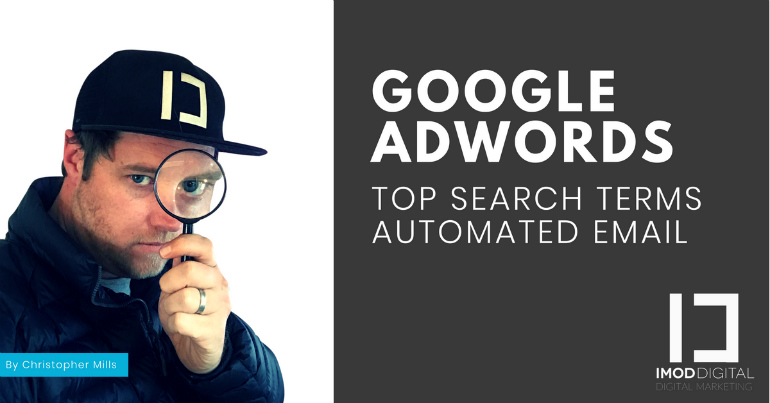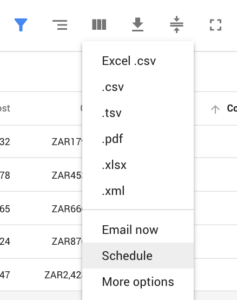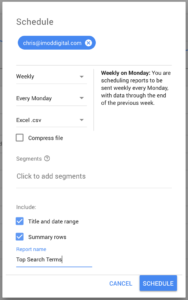If you're a seasoned AdWords practitioner, you'll know all about search terms but perhaps you won't know about automated emails. If you're an AdWords beginner or want to take your AdWords to the next level, this will be a valuable article for you to have a read of.
 At iMod Digital, we do a lot of Google AdWords work and a question I'm often asked is, "What are people actually searching for when they clicked on our advert?". With any experience in AdWords, you'll know about match types and you're hopefully using a combination of them. Because of this, you can see which keywords were clicked on but if you're using a broad, phrase or modifier, the keyword you're bidding on isn't necessarily what someone searched for. For example, if your keyword is '+seo +cape +town', someone may have actually searched for 'best seo in cape town" and your advert would have appeared and been clicked on. So, the question is, how do we find out that they searched for 'best seo in cape town'?
I hope the penny has dropped? These actual search queries are what we really want to know, not what we're bidding on but what people are actually searching for and clicking on our adverts. On step further, what queries are people searching for, clicking on our adverts and then turning into a lead or sale. Why? Because if we know those queries, we then know what we need to actually be bidding on.
Today I'm going to walk you through the process of figuring out what the actual search terms are that someone used in Google to come to your website. The best part, I'm going to show you how to do this once-off and from then onwards you'll receive an automated email with these search terms! Think about that for a second, imagine receiving an email once a week or once a month that shows you exactly which search queries your actual customers used - I think it's obvious as to why this is incredibly useful.
Let's jump in:
Note: For the safety of our client's data, I'm going to use a data set from iMod Digital from a certain point in time. Whenever we deal with conversions and search terms, it's like finding gold.
At iMod Digital, we do a lot of Google AdWords work and a question I'm often asked is, "What are people actually searching for when they clicked on our advert?". With any experience in AdWords, you'll know about match types and you're hopefully using a combination of them. Because of this, you can see which keywords were clicked on but if you're using a broad, phrase or modifier, the keyword you're bidding on isn't necessarily what someone searched for. For example, if your keyword is '+seo +cape +town', someone may have actually searched for 'best seo in cape town" and your advert would have appeared and been clicked on. So, the question is, how do we find out that they searched for 'best seo in cape town'?
I hope the penny has dropped? These actual search queries are what we really want to know, not what we're bidding on but what people are actually searching for and clicking on our adverts. On step further, what queries are people searching for, clicking on our adverts and then turning into a lead or sale. Why? Because if we know those queries, we then know what we need to actually be bidding on.
Today I'm going to walk you through the process of figuring out what the actual search terms are that someone used in Google to come to your website. The best part, I'm going to show you how to do this once-off and from then onwards you'll receive an automated email with these search terms! Think about that for a second, imagine receiving an email once a week or once a month that shows you exactly which search queries your actual customers used - I think it's obvious as to why this is incredibly useful.
Let's jump in:
Note: For the safety of our client's data, I'm going to use a data set from iMod Digital from a certain point in time. Whenever we deal with conversions and search terms, it's like finding gold.
 This like of search terms / keywords are the actual keywords that people searched for in Google and then clicked on our adverts. You're able to see which Campaign, which AdGroup, how many impressions, clicks, conversions and so forth each terms received. Now it's time to get some automation going...
This like of search terms / keywords are the actual keywords that people searched for in Google and then clicked on our adverts. You're able to see which Campaign, which AdGroup, how many impressions, clicks, conversions and so forth each terms received. Now it's time to get some automation going...
 It's a bit tricky to see but I've filtered to show only keywords that have had over 100 impressions and that have lead to a conversion. For me, these are the most valuable keywords and I'm going to want to receive those weekly. It's important to note that choosing the number of impressions depends on your industry - 100 may be far too small, if your keyword receive thousands of impressions then perhaps set the filter to a minimum of 1000 impressions for example. You may need to play around with this, the idea is to find those keywords which are bringing conversions but also get a large number of impressions because that shows us potential.
Now let's look at setting up the automatic emails:
Click on the little arrow at the top right and select schedule:
It's a bit tricky to see but I've filtered to show only keywords that have had over 100 impressions and that have lead to a conversion. For me, these are the most valuable keywords and I'm going to want to receive those weekly. It's important to note that choosing the number of impressions depends on your industry - 100 may be far too small, if your keyword receive thousands of impressions then perhaps set the filter to a minimum of 1000 impressions for example. You may need to play around with this, the idea is to find those keywords which are bringing conversions but also get a large number of impressions because that shows us potential.
Now let's look at setting up the automatic emails:
Click on the little arrow at the top right and select schedule:
 Once you've made this choice, choose your options, here is mine:
Once you've made this choice, choose your options, here is mine:
 You're done!
--
What I usually do is the following:
You're done!
--
What I usually do is the following:
 At iMod Digital, we do a lot of Google AdWords work and a question I'm often asked is, "What are people actually searching for when they clicked on our advert?". With any experience in AdWords, you'll know about match types and you're hopefully using a combination of them. Because of this, you can see which keywords were clicked on but if you're using a broad, phrase or modifier, the keyword you're bidding on isn't necessarily what someone searched for. For example, if your keyword is '+seo +cape +town', someone may have actually searched for 'best seo in cape town" and your advert would have appeared and been clicked on. So, the question is, how do we find out that they searched for 'best seo in cape town'?
I hope the penny has dropped? These actual search queries are what we really want to know, not what we're bidding on but what people are actually searching for and clicking on our adverts. On step further, what queries are people searching for, clicking on our adverts and then turning into a lead or sale. Why? Because if we know those queries, we then know what we need to actually be bidding on.
Today I'm going to walk you through the process of figuring out what the actual search terms are that someone used in Google to come to your website. The best part, I'm going to show you how to do this once-off and from then onwards you'll receive an automated email with these search terms! Think about that for a second, imagine receiving an email once a week or once a month that shows you exactly which search queries your actual customers used - I think it's obvious as to why this is incredibly useful.
Let's jump in:
Note: For the safety of our client's data, I'm going to use a data set from iMod Digital from a certain point in time. Whenever we deal with conversions and search terms, it's like finding gold.
At iMod Digital, we do a lot of Google AdWords work and a question I'm often asked is, "What are people actually searching for when they clicked on our advert?". With any experience in AdWords, you'll know about match types and you're hopefully using a combination of them. Because of this, you can see which keywords were clicked on but if you're using a broad, phrase or modifier, the keyword you're bidding on isn't necessarily what someone searched for. For example, if your keyword is '+seo +cape +town', someone may have actually searched for 'best seo in cape town" and your advert would have appeared and been clicked on. So, the question is, how do we find out that they searched for 'best seo in cape town'?
I hope the penny has dropped? These actual search queries are what we really want to know, not what we're bidding on but what people are actually searching for and clicking on our adverts. On step further, what queries are people searching for, clicking on our adverts and then turning into a lead or sale. Why? Because if we know those queries, we then know what we need to actually be bidding on.
Today I'm going to walk you through the process of figuring out what the actual search terms are that someone used in Google to come to your website. The best part, I'm going to show you how to do this once-off and from then onwards you'll receive an automated email with these search terms! Think about that for a second, imagine receiving an email once a week or once a month that shows you exactly which search queries your actual customers used - I think it's obvious as to why this is incredibly useful.
Let's jump in:
Note: For the safety of our client's data, I'm going to use a data set from iMod Digital from a certain point in time. Whenever we deal with conversions and search terms, it's like finding gold.
#1 Where are the search terms?
- Open up your Google AdWords account.
- Select a specific campaign, followed by clicking on Keywords, or just click on Keywords.
- Look at the top for the "SEARCH TERMS" drop-down menu and select "Search terms".
 This like of search terms / keywords are the actual keywords that people searched for in Google and then clicked on our adverts. You're able to see which Campaign, which AdGroup, how many impressions, clicks, conversions and so forth each terms received. Now it's time to get some automation going...
This like of search terms / keywords are the actual keywords that people searched for in Google and then clicked on our adverts. You're able to see which Campaign, which AdGroup, how many impressions, clicks, conversions and so forth each terms received. Now it's time to get some automation going...
#2 Setting up email automation
What we want to do next is set up some filtering and then set the account up to email us weekly with a list of the search terms that lead to conversions on our website. Think how useful that will be.. we're receiving our money keywords automatically in an email each week. From here we can focus our bids on these keywords using unique and targeted adverts.. we'll get higher click-through rates and far more conversions! Here are some things to think about:- We don't want to receive all of the search terms via email as it may be hundreds of them and that's a nightmare to look through, it doesn't isolate the best ones either.
- We don't want to see search terms that only receive a few impressions, rather let's filter to the search terms that receive a good number of few impressions and are, therefore, popular. This is important because it shows us that there is more potential to get out of the keyword.
- We want to see search terms that have lead to conversions because these are the ones making us money or at least bringing us good leads.
 It's a bit tricky to see but I've filtered to show only keywords that have had over 100 impressions and that have lead to a conversion. For me, these are the most valuable keywords and I'm going to want to receive those weekly. It's important to note that choosing the number of impressions depends on your industry - 100 may be far too small, if your keyword receive thousands of impressions then perhaps set the filter to a minimum of 1000 impressions for example. You may need to play around with this, the idea is to find those keywords which are bringing conversions but also get a large number of impressions because that shows us potential.
Now let's look at setting up the automatic emails:
Click on the little arrow at the top right and select schedule:
It's a bit tricky to see but I've filtered to show only keywords that have had over 100 impressions and that have lead to a conversion. For me, these are the most valuable keywords and I'm going to want to receive those weekly. It's important to note that choosing the number of impressions depends on your industry - 100 may be far too small, if your keyword receive thousands of impressions then perhaps set the filter to a minimum of 1000 impressions for example. You may need to play around with this, the idea is to find those keywords which are bringing conversions but also get a large number of impressions because that shows us potential.
Now let's look at setting up the automatic emails:
Click on the little arrow at the top right and select schedule:
 Once you've made this choice, choose your options, here is mine:
Once you've made this choice, choose your options, here is mine:
 You're done!
--
What I usually do is the following:
You're done!
--
What I usually do is the following:
- I'll run the report with filtering for the past year or so that the account has been running. This alone brings out all those top keywords for you to start looking into already. You can download this and open it in Excel to start investigating. You should be bidding on all of these keywords, or at least the top 20% that bring in conversions.
- I'll set up my automated emails to email me weekly and I'll note down the top keywords for a few weeks. As the weeks go by, you should start to notice repeat keywords - either you do this by memory or you keep another Excel spreadsheet that you amend each week. It's important to note that you're looking for opportunity, not just the same keywords, though. If you see a keyword getting good conversions that still has a high impression account, consider isolating that keyword.
- When I've discovered a good keyword or two, I'll then write specific advert copy for these keywords. The idea is that the copy for the advert includes the keyword and talks to the keyword - you want a very relevant association between the two. From here I'll create a new Campaign or AdGroup, depending on how your account is structured, load up the keyword as an exact match, load the advert and then choose the correct page on the website to point the very Campaign to.
